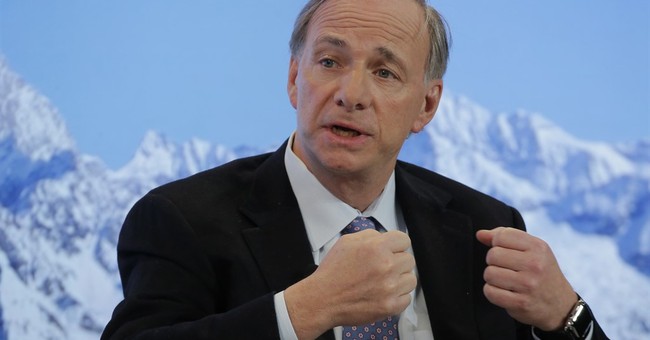
Source: AP Photo/Michel Euler
Hayek wrote in Intellectuals and Socialism that, “The main task of those who believe in the basic principles of the capitalist system must frequently be to defend this system against the capitalists--indeed the great liberal economists, from Adam Smith to the present, have always known this.”
Capitalists have always threatened capitalism more than socialists. When they’re not defrauding stock holders as did Enron, being fined by the government as happened to Wells Fargo, having the state bail them out of trouble like General Motors and the biggest banks, killing people with faulty software as Boeing did, or bribing politicians for favors and protection, capitalists are busy trashing the capitalist system that made their success possible. Warren Buffet, Bill Gates, George Soros, and others have done it. Now Ray Dalio, the founder of Bridgewater Associates, stabs the invisible hand that fed him with his posts “Why and How Capitalism needs to be Reformed.”
Dalio stumbles right out of the gate with his notion of capitalism, calling it “...the ability to make money, save it, and put it into capital (i.e., capitalism)...” That is commerce, not capitalism. Capitalism is a system composed of limited government that protects the life, liberty, and property of its citizens, free markets, individualism, mass production, and respect for commerce. The U.S. hasn’t enjoyed a capitalist system for at least a century, even though we have a lot of capitalists.
Dalio offers his screed in two parts because it’s long, but it’s long because he is too wordy and microwaves socialist talking points for the past generation. His main complaints are growing inequality and the persistence of poverty. He thinks the main causes are increasing use of technology, outsourcing, international trade, poor budgeting by governments, and money printing by the Fed. The last is his best point:
Central banks’ printing of money and buying of financial assets (which were necessary to deal with the 2008 debt crisis and to stimulate economic growth) drove up the prices of financial assets, which helped make people who own financial assets richer relative to those who don’t own them. When the Federal Reserve (and most other central banks) buys financial assets to put money in the economy in order to stimulate the economy, the sellers of those financial assets (who are rich enough to have financial assets) a) get richer because the financial asset prices rise and b) are more likely to buy financial assets than to buy goods and services, which makes the rich richer and flush with money and credit while the majority of people who are poor don’t get money and credit because they are less creditworthy.He's wrong about the Fed’s counterfeiting money being necessary to save us from ruin, but he got the important part right. Economists call the results “Cantillon Effects” and they’re one of the major causes of the inequality and persistent poverty that Dalio abhors. Counterfeiting by the Fed steals money from the poor and middle classes to give to the wealthy.
The other major cause of inequality is the Bootleggers and Baptists syndrome in which corporations capture regulatory agencies in order to write regulations that give them oligopolies in their industries. Oligopolies allow corporations to charge higher prices, earn larger profits and pay their executives higher salaries.
Increasing use of technology by businesses, outsourcing and international trade, Dalio’s poor-eating dragons, help the poor by reducing their cost of living. They help the poor instead of hurting them as Dalio argues.
The major causes of poverty in the U.S. have been the explosion in the numbers of poor immigrants and households headed by young single mothers with no education. None of Dalio’s solutions will address those problems.
The biggest weakness of Dalio’s articles is that he fails to explain why half a century of massive spending on the poor has yielded such a poverty of results. President Johnson launched his Great Society war on poverty in 1965. For socialists, that was 54 years ago. Except for mild welfare reforms in the 1990s, spending on the poor has increased dramatically since then and now takes up about 25% of the federal budget and most of state budgets, including massive spending on pre-school, which Dalio seems to think would end all of our problems. The failure of those programs should shock the “data driven” Dalio.
Unfortunately, Dalio’s solutions have almost no relationship to problems he identifies. He timidly recommends better leadership, political bipartisanship, clear metrics for judging the success of government programs, and more failed wealth redistribution.
If he didn’t have something new to offer, why did Dalio write such long articles? He is “virtue signaling.” He’s begging socialists not to hate him for his wealth because he is arguing against his own interests to prove that he is one of them. That’s what successful people do when they fear the envy of others.
No comments:
Post a Comment